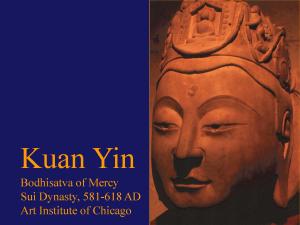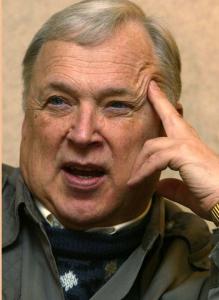 Jesus told his disciples, “If any want to become my followers, let them deny themselves and take up their cross and follow me.” (Matthew 16:24)
Jesus told his disciples, “If any want to become my followers, let them deny themselves and take up their cross and follow me.” (Matthew 16:24)
Self-Sacrificial Love & Buddha’s Self-Renunciation (Anatta or non-self). Are they the same? Sometimes it’s hard to know how it matters.
The Story of the Buddha
It was story time. The children were sitting around the dining room table. I fished through my mind for a story to tell, one they might not have heard before. I decided to tell them a story which I find very meaningful and hold in high respect, namely, the biography of the Buddha. After all, the Buddha story makes a good point that would be helpful in life, namely, self-renunciation And parents are supposed to leave their children with noble ideals, aren’t they?
Because the oldest of my three listeners was only six, I had to modify a few details to keep their interest. I nicknamed the protagonist, Sidharta Gautama the Sakyamuni who became the Buddha, Sid. I told how Sid grew up in a castle as the son of the king. But instead of describing Sid as a young man whose monarch father sent him an endless supply of fine drink and sexy dancing girls to keep his manly interests occupied, I described the young Buddha as a child like those sitting around the table. Instead of booze and sex, in my version the king lavished the young boy with an endless supply of toys and treats. His bedroom was filled to overflowing with tricycles, baseball mitts, dolls, trucks, miniature furniture, and even had its own freezer loaded with ice cream bars.
But, alas, all of these worldly pleasures failed to make little Sid happy. He wanted something deeper. He wanted to know the meaning of life. So, he went out to search. During his three secret trips outside the palace walls he saw a very old person, a very sick person, and the corpse of someone who had died. Realizing that someday he too might become afflicted with old age or disease and have to die, young Sid was shocked. So, he abandoned his royal life in the palace. He left all of his toys and ice cream bars,. And, he headed out on his own to find the meaning of life.
Then, I described how Sid went to the opposite extreme of self-renunciation. How Sid embraced total poverty. How Sid denied himself all worldly pleasures. How Sid fasted until his body was weakened from lack of food. I followed this with the account of Sid’s sitting all night beneath the Bodhi tree, the tree of enlightenment. I explained how the goal of Sid’s great search was reached through a mystical vision. The question of the meaning of life had been answered.
With considerable drama I had those kids sitting on the edge of their chairs in anticipation. The story’s climax was at hand. “Do you know what the Buddha discovered to be the secret meaning to all existence?” I asked.
“No, what?” they demanded.
Then I found myself pondering: how can I sum up the Four Noble Truths of Buddhism? What can I say about self-renunciation that might have a lasting impact on these tender young lives? How can I best formulate the message I am about to deliver?
I went with this: “The great insight that Sid the Buddha learned that night was this:
If we want something we cannot have, then we will feel sorry for ourselves and suffer pain. But, if we can let go of our desire to possess the things of this world, then we can find true fulfillment and happiness in a life of selfless devotion.”
I wasn’t sure just how historically accurate this was, but it sounded profound to me.
 Buddha’s Self-Renunciation? Really?
Buddha’s Self-Renunciation? Really?
Every eye was still concentrated on me. The children seemed aghast even amazed and deeply impressed by what I had said. What a wedding of masterful story telling and attentive listening! For a moment I felt that little twinge of victory, as if this were a triumph of fatherhood in which I had successfully executed my responsibility for leading the young toward high-minded maturity.
Kathy Kim, then age five, was the first to speak. “Daddy,” she said still pondering the importance of what had gone on; “when Sid left his bedroom at the palace, he never went back, did he?”
“No, never.” I had the feeling that with this period of dialogical interchange we might be able to reinforce the great lesson that was at stake.
“Then,” Kathy Kim went on, “I bet all those toys and ice cream bars are still there in the bedroom. Do you think the king would mind if we went there to play with them?”
A pin had just pricked and burst my balloon. Whatever self-congratulations I had just commended to myself immediately dissipated. I had to laugh at myself. I had to come to appreciate both the seriousness of the children’s attention and, in its own way, the beauty of their preoccupations.
Perhaps in some small fashion I, like the Buddha himself, was being shocked into realizing the ephemerality of attachments to things in this world. This might include my attachment to masterful story-telling and responsible fatherhood.
Maybe the Middle Way for a Christian is to love and appreciate our life just the way it is today, while still maintaining the awareness that this day will pass and a new reality will eventually take its place. In the meantime, a sense of humor helps.
PRAYER
O God, who creates this world and the next, guide us into seeing both the profundity and the humor of this your beloved creation. Amen.
▓
 Ted Peters is a Lutheran pastor and emeritus seminary professor. He is author of Short Prayers and The Cosmic Self. His one volume systematic theology is now in its 3rd edition, God—The World’s Future (Fortress 2015). He has undertaken a thorough examination of the sin-and-grace dialectic in two works, Sin: Radical Evil in Soul and Society (Eerdmans 1994) and Sin Boldly! (Fortress 2015). Watch for his forthcoming, The Voice of Public Christian Theology (ATF 2022). See his website: TedsTimelyTake.com.
Ted Peters is a Lutheran pastor and emeritus seminary professor. He is author of Short Prayers and The Cosmic Self. His one volume systematic theology is now in its 3rd edition, God—The World’s Future (Fortress 2015). He has undertaken a thorough examination of the sin-and-grace dialectic in two works, Sin: Radical Evil in Soul and Society (Eerdmans 1994) and Sin Boldly! (Fortress 2015). Watch for his forthcoming, The Voice of Public Christian Theology (ATF 2022). See his website: TedsTimelyTake.com.
▓













